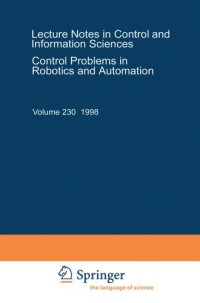
Ebook: Control Problems in Robotics and Automation
- Genre: Technique // Electronics: Robotics
- Tags: Engineering Economics Organization Logistics Marketing, Mechanical Engineering, Control Engineering, Automation and Robotics
- Series: Lecture Notes in Control and Information Sciences 230
- Year: 1998
- Publisher: Springer-Verlag Berlin Heidelberg
- City: London; New York
- Edition: 1
- Language: English
- pdf
Focusing on the important control problems in state-of-the-art robotics and automation, this volume features invited papers from a workshop held at CDC, San Diego, California. As well as looking at current problems, it aims to identify and discuss challenging issues that are yet to be solved but which will be vital to future research directions. The many topics covered include: automatic control, distributed multi-agent control, multirobots, dexterous hands, flexible manipulators, walking robots, free-floating systems, nonholonomic robots, sensor fusion, fuzzy control, virtual reality, visual servoing, and task synchronization. Control Problems in Robotics and Automation will be of interest to all researchers, scientists and graduate students who wish to broaden their knowledge in robotics and automation and prepare themselves to address and resolve the control problems that will be faced in this field as we enter the twenty-first century.
Focusing on the important control problems in state-of-the-art robotics and automation, this volume features invited papers from a workshop held at CDC, San Diego, California. As well as looking at current problems, it aims to identify and discuss challenging issues that are yet to be solved but which will be vital to future research directions. The many topics covered include: automatic control, distributed multi-agent control, multirobots, dexterous hands, flexible manipulators, walking robots, free-floating systems, nonholonomic robots, sensor fusion, fuzzy control, virtual reality, visual servoing, and task synchronization. Control Problems in Robotics and Automation will be of interest to all researchers, scientists and graduate students who wish to broaden their knowledge in robotics and automation and prepare themselves to address and resolve the control problems that will be faced in this field as we enter the twenty-first century.